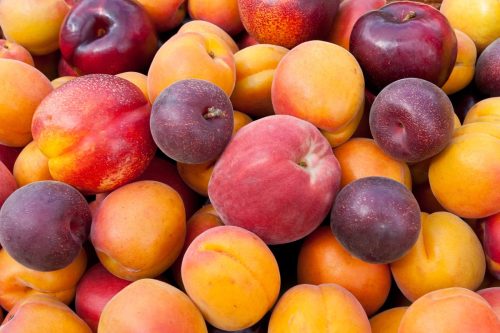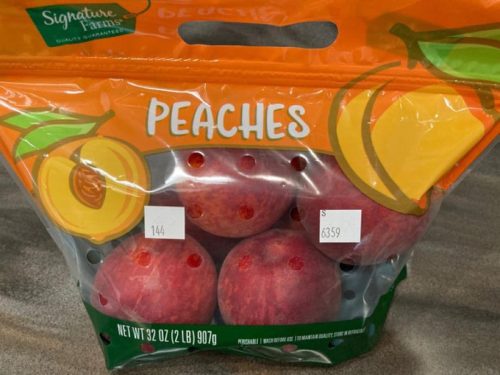Deadly Listeria Outbreak Spreading in 7 States—These Are the Symptoms

‘Tis the season for eating. But while many of us are indulging ourselves with holiday treats, it’s the healthier options that could be cause for concern right now. Officials are now reported a new Listeria outbreak linked to fresh fruit. Cases have been reported in seven states and one person has died from listeriosis so far. Read on to find out more about the current outbreak, and the symptoms you should be looking out for.
RELATED: These Are the Foods Most Likely to Cause Listeriosis.
The FDA just announced a new fruit recall.

On Nov. 17, the U.S. Food and Drug Administration (FDA) released a company announcement from HMC Group Marketing, Inc., about a recall related to its HMC Farms business. According to the release, the company is voluntarily recalling peaches, plums, and nectarines, that were sold in retail stores from between May 1 and Nov. 15, 2022, and between May 1 and Nov. 15, 2023.
“The fruit is being recalled because it has the potential to be contaminated with Listeria monocytogenes,” HMC Group Marketing, Inc., said in its announcement. “This recall includes only conventionally grown fruit – no organic fruit is being recalled. Peaches, plums, and nectarines currently available for sale at retail stores are not included in this recall.”
RELATED: OTC Pain and Fever Meds Recalled Over “Health Risk,” FDA Warns.
The recalled fruit been linked to a deadly multi-state Listeria outbreak.

In the recall announcement, HMC Group Marketing, Inc., said that its recalled peaches have been linked to a Listeria outbreak. On Nov. 20, the Centers for Disease Control and Prevention (CDC) released a public alert about the outbreak, and confirmed that it was investigating the matter alongside the FDA.
According to the CDC, this Listeria outbreak has already infected 11 people who are located in seven different states across the country: California, Florida, Colorado, Kansas, Illinois, Ohio, and Michigan. The multi-state outbreak has already turned deadly, with 10 hospitalizations and one death reported so far.
“The true number of sick people in this outbreak is likely higher than the number reported, and the outbreak may not be limited to the states with known illnesses,” the CDC warned.
RELATED: FDA Warns Common Soda Ingredient Is Toxic to Your Thyroid.
You should not eat any of the recalled products.

To make sure you stay safe, the CDC said you should not eat any recalled peaches, nectarines, and plums.
“Check your home, including your refrigerator and freezer, for any recalled fruit,” the agency advised. “If you think you have any, throw them away or return them to the store.”
If you do have or have had any of the recalled fruits, the CDC said you should also clean your refrigerator, containers, and other surfaces that may have touched the potentially contaminated product.
“Listeria can survive in the refrigerator and can easily spread to other foods and surfaces,” the agency cautioned.
You should also watch out for certain symptoms.

Listeria is not something you should take lightly. This bacteria can contaminate foods and then infect people who consume them with a disease called listeriosis—which is most dangerous for people who are pregnant, adults aged 65 or older, and people with weakened immune systems.
“CDC estimates that Listeria is the third leading cause of death from foodborne illness in the United States,” the agency states on its website.
If you have eaten any of the recalled fruit, the CDC said you should call a healthcare provider right away if you start experiencing certain symptoms. For pregnant people, signs of listeriosis may include fever, muscles aches, and tiredness. People who are not pregnant can experience these three symptoms as well, but they may also get a headache, stiff neck, confusion, loss of balance, or seizures, according to the agency.
Be wary that it can take time for these listeriosis signs to show up, too.
“Symptoms usually start within two weeks after eating food contaminated with Listeria, but may start as early as the same day or as late as 10 weeks after,” the CDC says.
RELATED: For more up-to-date information, sign up for our daily newsletter.
- Source: https://www.fda.gov/safety/recalls-market-withdrawals-safety-alerts/hmc-farms-voluntarily-recalls-whole-peaches-plums-and-nectarines-sold-retail-stores-2022-and-2023
- Source: https://www.cdc.gov/listeria/outbreaks/peaches-11-23/details.html
- Source: https://www.cdc.gov/listeria/outbreaks/peaches-11-23/map.html
- Source: https://www.cdc.gov/listeria/faq.html